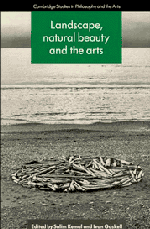Book contents
- Frontmatter
- Contents
- List of contributors
- Editors' acknowledgments
- 1 Nature, fine arts, and aesthetics
- 2 Natural beauty without metaphysics
- 3 Trivial and serious in aesthetic appreciation of nature
- 4 The public prospect and the private view: the politics of taste in eighteenth-century Britain
- 5 Landscape in the cinema: the rhythms of the world and the camera
- 6 The touch of landscape
- 7 Desert and ice: ambivalent aesthetics
- 8 Gardens, earthworks, and environmental art
- 9 Comparing natural and artistic beauty
- 10 Appreciating art and appreciating nature
- 11 The aesthetics of art and nature
- 12 On being moved by nature: between religion and natural history
- Index
3 - Trivial and serious in aesthetic appreciation of nature
Published online by Cambridge University Press: 03 May 2011
- Frontmatter
- Contents
- List of contributors
- Editors' acknowledgments
- 1 Nature, fine arts, and aesthetics
- 2 Natural beauty without metaphysics
- 3 Trivial and serious in aesthetic appreciation of nature
- 4 The public prospect and the private view: the politics of taste in eighteenth-century Britain
- 5 Landscape in the cinema: the rhythms of the world and the camera
- 6 The touch of landscape
- 7 Desert and ice: ambivalent aesthetics
- 8 Gardens, earthworks, and environmental art
- 9 Comparing natural and artistic beauty
- 10 Appreciating art and appreciating nature
- 11 The aesthetics of art and nature
- 12 On being moved by nature: between religion and natural history
- Index
Summary
The aesthetic appreciation of both art and nature is often, in fact, judged to be more – and less – serious. For instance, both natural objects and art objects can be hastily and unthinkingly perceived, and they can be perceived with full and thoughtful attention. In the case of art, we are better equipped to sift the trivial from the serious appreciation; for the existence of a corpus, and a continuing practice, of criticism (and philosophical study) of the arts – for all their internal disputatiousness – furnishes us with relevant criteria. In the case of nature, we have far less guidance. Yet it must matter, there too, to distinguish trivial from serious encounters. When we seek to defend areas of “outstanding natural beauty” against depredations, it matters greatly what account we can give of the appreciation of that beauty: how its value can be set alongside competing and vociferously promoted values involved in industry, commerce and urban expansion. If we wish to attach very high value to the appreciation of natural beauty, we must be able to show that more is involved in such appreciation than the pleasant, unfocused enjoyment of a picnic place, or a fleeting and distanced impression of countryside through a touring-coach window, or obligatory visits to standard viewpoints or (should I say) snapshot-points.
That there is much work to be done on this subject is of course due to the comparative neglect of natural beauty in recent and fairly recent aesthetics.
- Type
- Chapter
- Information
- Landscape, Natural Beauty and the Arts , pp. 65 - 80Publisher: Cambridge University PressPrint publication year: 1993
- 23
- Cited by



